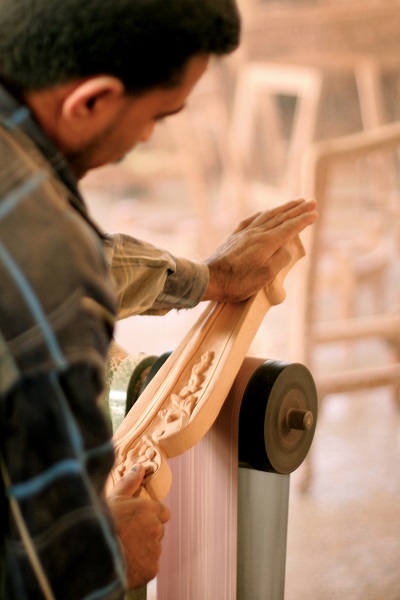The government plans to turn Damietta into a Global City for the furniture industry Ahmed El-Mahdi reports
As the State seeks to take real steps towards establishing Damietta Furniture City as an industry capital in the Middle East, the Egyptian Furniture Export Council (EFEC) says the city needs funding worth at least LE3bn if the project is to reach fruition in less than two years. The final plan for the city, which is expected to attract investments amounting to LE12bn, will be presented to the Cabinet within days.
Meanwhile the Furniture Development Association in Damietta has called for the establishment of an LE20mn technological service centre which they say would contribute greatly to promoting the industrial sector.
The final vision of Damietta Furniture City is expected to be presented within days. According to the deputy head of the EFEC, Abdou Sholah, it will include several aspects as regards funding, city management systems and the study of the government’s in kind participation on the ground.
The visualisation includes the establishment of a company to manage the city, although mechanisms of its establishment will be discussed after approval by the Cabinet. It also stresses the need for laws to govern this city without the red tape that binds other industrial zones, Sholah says.
The government is aiming to establish a model in the Middle East and this makes special and relevant laws a necessity, Sholah adds. He explains that China has issued special laws for industrial cities to enhance industry and investment, and these are proving very effective.
He adds that it has not yet been decided whether an investor will be sought, or whether an industrial developer will be assigned to prepare the land as in the case with the funding, which amounts to at least LE3bn. However, funding methods, whether banks or others, have not yet been decided.
In the case of bank funding, the interest rate should be low so as not to reflect negatively on the rent value of industrial facilities in the city which are expected to reach 2,400 factories and workshops over an area of 331 feddans, Sholah says. He points out that renting a facility is preferable to land ownership to avoid freezing operations.
The head of the Damietta Development Association, Abdullah Hassan, pinpoints a number of axes that will make Damietta a model for industry in the Middle East, namely the establishment of technological service centres to help more than 400,000 workshops. This will reflect positively on increasing production and quality after providing modern technology used in the industry, he adds.
The cost of establishing a technological service centre is estimated at LE20mn, but it will help boost the industrial sector, he says, adding that it is necessary to attract investments in complementary industrial, sectors such as door furniture—knobs, etc.—particularly when the sector depends on importing 99 per cent of its raw materials, worth half a billion Egyptian pounds, as they are not manufactured locally.
In addition to establishing a permanent international exhibition to display various items of production, 55 feddans have been allocated for exhibition space, and this requires offering the project for sharing so as to raise the necessary funds. This will also help increase sales and make it a real capital for the furniture industry in the region.
Sholah says Damietta has the ability to accommodate investments worth LE2bn, and this will bring total investments to LE3bn distributed among factories and workshops and, therefore, provide job opportunities.
He points out that there are close to 100 large furniture factories in Damietta, as well as 70,000 small workshops, including 20,000 that are registered. Together these produce about 80 per cent of Egypt’s furniture. Damietta exports about 30 per cent of its production with a worth of LE500mn, while the other 70 per cent, worth between LE1.5 and LE2bn, is pumped into the local market.
The industry currently employs 400,000 people but is suffering from a lack of skilled workers. Pumping in new investment requires a new labour strategy to reduce the unemployment rate.
The EFEC recently announced that it would provide the needs of the industry in Damietta under the New Furniture City scheme, which could attract new investments to Egypt worth more than LE12bn and could raise exports to more than LE3bn annually.
The proposed project includes the establishment of an industrial complex comprising some 125 large and medium factories on plots of land of between 2,000 and 10,000 square metres, in addition to a complex of small and feed industries for furniture that could accommodate 2,200 factories and small workshops of between 200 and 1,000 square metres each, according to Ihab Derias, the council’s director.
The scheme also includes conferences and furniture exhibition centres and showrooms of furniture for the local market and for importers, who can visit all year round to secure contracts, Derias says. It also comprises furniture accessories and a training and education academy to create a new generation of technical labourers for the industry who are capable of dealing with the latest technology. The aim is to make the city similar to the large industrial centres we see in Italy and China.
The scheme also includes the establishment of a furniture museum to showcase Egyptian furniture throughout history, from the pharaonic era through to the Roman-Greek, Coptic and Islamic eras and as well as classic and modern furniture.














